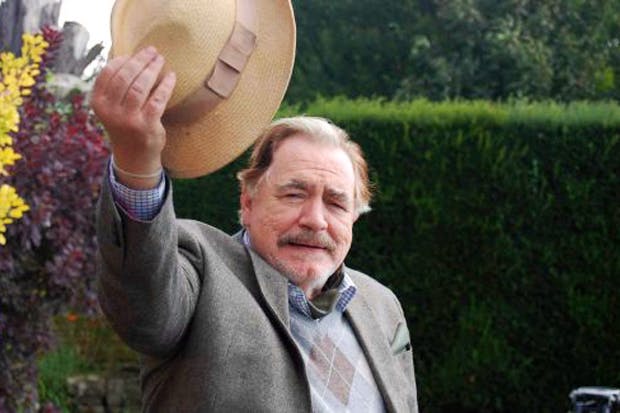The Carer is a Hungarian-British co-production about a cantankerous old thesp (Brian Cox) and the young Hungarian woman (Coco König) who is dispatched to look after him, much against his wishes, and whom he’ll eventually throw out on her ear. I’m joshing you. She wins him over, naturally, and mutual respect develops, naturally, and a friendship blossoms, naturally, although I wish he’d thrown her out on her ear as that way this wouldn’t have felt like something we’ve seen a hundred times before. There are affecting, powerful films to be made about old age, loss, mortality and dependence, but this, alas, has all the emotional grit of a Driving Miss Daisy. I happened to watch it with my own father (93), who offered a one-word verdict and that one word was: ‘Corny.’
In the film, directed by Janos Edelenyi, who co-wrote with the late Gilbert Adair, Cox plays Sir Michael Gifford, a retired British acting great who has Parkinson’s disease, is fantastically ill-tempered, and spends his days watching himself in old films, bellowing Shakespearean soliloquies, and sparring with his stock villain of a bossy daughter (Emilia Fox). ‘Stop being an old ham!’ she shouts at him, and I have to say that I was with her all the way from quite early on. He also has a long-suffering housekeeper (Anna Chancellor), who was once romantically involved with him, as she will explain, because if there is one thing everyone does in this film it’s explain themselves, fully, and at length.
The young Hungarian carer is Dorottya (König), who is driven to Sir Michael’s magnificent country house by the chauffeur who used to be Sir Michael’s dresser. En route, he fills her in, making it such an exposition-heavy journey I bet she wished she’d taken a cab, and hang the expense. Sir Michael’s King Lear made everyone weep, she is told. The bossy daughter wants him to sell the house, she is told. And also: ‘No, he’s not difficult. He’s bloody impossible!’ To bond or not to bond, that isn’t the question, as there is never any doubt as to where this is going. Not even a smidgen.
The bossy daughter isn’t sure about Dorottya, as isn’t the housekeeper, as isn’t Sir Michael’s doctor, but she talks them round, employing what may be the most horribly phrased, jarring line of all time. She looked after her own father, she says, ‘and before he died I saw how much he was suffering because he could not produce …a stool? And so I inserted my finger in his rectum…’ (Dad, I know you’ll be reading this, and just so we’re clear: I love you very, very much but that is never going to happen. Ever. You hear?) The Carer is quite scatologically obsessed, in fact, but in such a crude way it may well make you wonder what old people have done to deserve this indignity, on top of all else.
The two first meet when he takes a tumble in the rose garden and she heaves him to his feet. ‘I feel like Buster Keaton on a bad day,’ he says. Nothing in the script has the ring of truth about it, just as none of the characters have the ring of truth about them. It turns out that Dorottya is a keen thesp herself, is auditioning for drama schools, and can match Sir Michael soliloquy for soliloquy. The narrative force, such as it is, centres on whether he’ll appear in person to collect a lifetime-achievement award when his daughter (what’s her problem? That, we never know) has forbidden him to do so. The latter part of the film actually feels like a sports movie — will he or won’t he take to the podium? — and is accompanied by much tinkly piano music, in the unlikely instance the sentimentality has passed you by.
The performances are possibly fine. König is suitably endearing while Cox rages vigorously against the dying of the light, but as everything else is so hackneyed, it all seems rather pointless. As for the ending, which rushes to tie up all the threads happily, it’s ‘corny’, just like my father said. But at least in watching it together we know where we stand on that issue. (Don’t we, Dad? Don’t we? Please say we do.)
Got something to add? Join the discussion and comment below.
Get 10 issues for just $10
Subscribe to The Spectator Australia today for the next 10 magazine issues, plus full online access, for just $10.














Comments
Don't miss out
Join the conversation with other Spectator Australia readers. Subscribe to leave a comment.
SUBSCRIBEAlready a subscriber? Log in